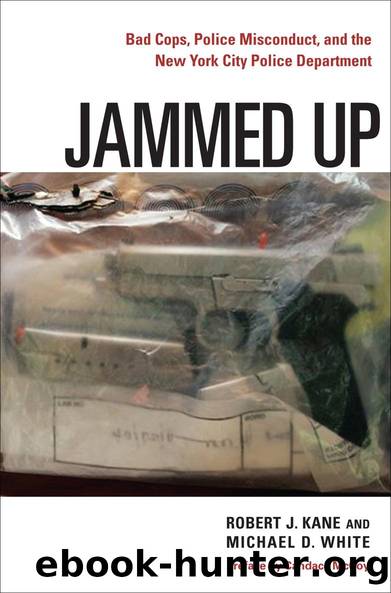Jammed Up by Robert J. Kane Michael D. White

Author:Robert J. Kane, Michael D. White [Robert J. Kane, Michael D. White]
Language: eng
Format: epub
Tags: Social Science, Criminology, Law, Criminal Law, General, Political Science, Law Enforcement, Sociology
ISBN: 9780814748411
Google: q0kTCgAAQBAJ
Publisher: NYU Press
Published: 2012-01-01T04:24:32+00:00
Reviewing Macro-Level Findings
After leaving the NYPD as a researcher in 1999, the first author published a series of academic articles examining different dimensions of policing and police misconduct from the view of patrol precincts. Collectively, such examinations demonstrate how the social ecology of police officersâ working environments can influence patterns of policing and police misconduct, as well as organizational decisions about deployment and so-called aggressive policing practices. Additionally, given that all of these examinations were longitudinal, they allow us to draw conclusions about the importance of considering not just where the policing took place, but also when it took place.
In the first of these papers, titled âThe Social Ecology of Police Misconduct,â Kane4 combined the NYPD data with U.S. Census Bureau data to examine the extent to which the structural antecedents of social disorganization and racial conflict predicted patterns of police misconduct within and between police precincts from 1975 to 1996. The study found that structural disadvantage,5 population mobility,6 and changes in percent Latino population were associated with misconduct within precincts over time. These findings indicated that systemic resource deprivation, barriers to upward mobility, and political marginalization (all indicated by structural disadvantage), as well as continuously disrupted local social networks (indicated by population mobility), likely made it difficult for residents to invoke the conventional mechanisms of police accountability in response to incidents of officer misconduct. That increases in percent Latino predicted increased misconduct (even while changes in percent black population did not) also suggested something about the unwillingness and/or inability of largely Latino communities to report and/ or effectively protect against police misconduct. In addition, all of these macro-indicators suggest an overall opportunity structure for police misconduct that likely did not exist in more economically and socially stable communities.
In the public health arena, researchers have identified a phenomenon known as the âdouble jeopardyâ hypothesis.7 According to the hypothesis, when the structural features of place create systemic opportunities for disease pathologies to develop and sustain, and when the same structural features make it difficult or impossible for community residents to harness external government and/or health resources to respond to the disease, the community is victimized twice â partly due to opportunities and partly due to a lack of political clout to combat the opportunities. To a great extent, Kaneâs8 study represents an application of the double jeopardy hypothesis to the social ecology of police misconduct with one important addition. First, structural disadvantage likely created opportunity structures for police misconduct, and at the same time made it difficult or impossible for community members to effectively hold the police accountable for misconduct. Next, these were the same communities that experienced the highest crime rates in the city over the study period, which theoretically suggests a need for the increased deployment of crime control resources to these communities. Thus, and as Kane9 notes, âthe very communities likely in need of the most protection by the police due to conditions favoring deviance also may be in need of the greatest protection from the police due to conditions favoring devianceâ (emphasis added).
Download
This site does not store any files on its server. We only index and link to content provided by other sites. Please contact the content providers to delete copyright contents if any and email us, we'll remove relevant links or contents immediately.
The Borden Murders by Sarah Miller(4325)
The Secret Barrister by The Secret Barrister(3708)
Police Exams Prep 2018-2019 by Kaplan Test Prep(2546)
Coroner's Journal by Louis Cataldie(2477)
The Splendid and the Vile by Erik Larson(2472)
Terrorist Cop by Mordecai Dzikansky & ROBERT SLATER(2078)
A Colony in a Nation by Chris Hayes(1934)
My Dark Places by James Ellroy(1931)
The Art of Flight by unknow(1878)
Black Klansman by Ron Stallworth(1793)
Objection! by Nancy Grace(1782)
A Life of Crime by Harry Ognall(1729)
The New Jim Crow by Michelle Alexander(1702)
Anatomy of Injustice by Raymond Bonner(1668)
American Prison by Shane Bauer(1658)
Invisible Women by Caroline Criado Perez;(1642)
Whoever Fights Monsters by Robert K. Ressler(1616)
Obsession (The Volkov Mafia Series Book 1) by S.E Foster(1578)
A is for Arsenic: The Poisons of Agatha Christie (Bloomsbury Sigma) by Kathryn Harkup(1548)
